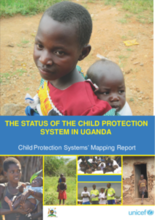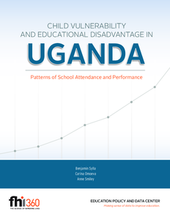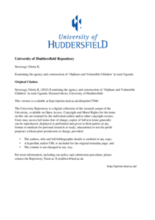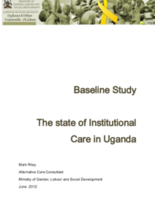This country page features an interactive, icon-based data dashboard providing a national-level overview of the status of children’s care and care reform efforts (a “Country Care Snapshot”), along with a list of resources and organizations in the country.
demographic_data
childrens_living_arrangement
children_living_without_bio
social_work_force
key_stakeholders
Key Stakeholders
Add New DataOther Relevant Reforms
Add New Datadrivers_of_institutionalisation
Drivers of Institutionaliziation
Add New Datakey_research_and_information
Key Data Sources
Add New DataThe Children Act (Uganda)
Country Care Review: Uganda
Prevalence and number of children living in institutional care: global, regional, and country estimates
The National Integrated Early Childhood Development Policy Action Plan (2016-2021) of Uganda
Catholic Care for Children in Uganda: A Family for Every Child - Findings from a Midterm Evaluation
Acknowledgements
Data for this country care snapshot was contributed by a consultant with the Data for Impact (D4I) Project at Palladium Group LLC.
Displaying 351 - 360 of 418
Charts that accompany the article Orphan Fever: The Evangelical Movement’s Adoption Obsession, illustrating the trends in international adoptions from Liberia, Kyrgyzstan, Ethiopia, Uganda, and Haiti to families in the United States.
This mapping process was commissioned by the Ministry of Gender, Labour and Social Development in order to facilitate the transitioning of Uganda’s approach to child protection from a disjointed, issue-based and project-oriented approach to a more system-oriented approach in order to respond effectively to the multi-dimensional and complex child protection needs of all children in the country.
This paper analyzes the extent to which official government “child vulnerability” indicators are associated with two important components of educational disadvantage: school enrollment and sixth grade learning outcomes in Uganda.
Focussing on Sheema district in rural Uganda, this study sought to give voice to ‘OVC’ and use their lived experiences to develop a robust framework of care and support.
In this report, Retrak examines the situation of girls living on the streets in Kampala, Uganda and Addis Ababa, Ethiopia, and provides key recommendations on the development programs required to address their needs. The report urges for scaling up services, building new facilities for street girls, and building staff capacity to handle issues related to this population.
This paper investigates the time–space practices of young people caring for their siblings in youthheaded households affected by AIDS in Tanzania and Uganda. Based on qualitative exploratory research with young people heading households, their siblings, NGO workers and community members, the article develops the notion of sibling ‘caringscapes’ to analyse young people’s everyday practices and caring pathways through time and space.
Retrak’s technical brief on family reintegration for children living on the streets, acknowledges the difficulties which street children face at home and on the streets. But it also demonstrates that successful family reintegration is possible for street children when there is a focus on the individual child, building positive attachments with care-givers, strengthening families capabilities and involving the wider community.
Retrak is a UK based charity that works with street associated children in Africa to give them a real alternative to life on the street. The following success stories of outreach and reintegration show a promising model for children globally.
This document summarises the key findings of the project to-date and the current status of the child care and alternative care directory. It also outlines some key activities that need to be undertaken for the MoGLSD to start to address the issues outlined within the report. The MoGLSD has carefully evaluated the baseline study and after a number of consultations wish to put forward this document as a proposal to address the serious issues of children without parental care and the growing number of children’s homes.
Over the past two decades of humanitarian work in northern Uganda, national and international child-focused organisations as well as government departments responsible for children have built a rich body of knowledge that has informed child protection work throughout the country. The development of this Child Protection Curriculum and related training materials is therefore a first step by the Ministry of Gender, the Ministry of Labour and Social Development, the United Nations Children’s Fund (UNICEF), the Child Protection Working Group in Uganda, and selected academic institutions to professionalise the child protection sector within the broader realm of social work in Uganda.







